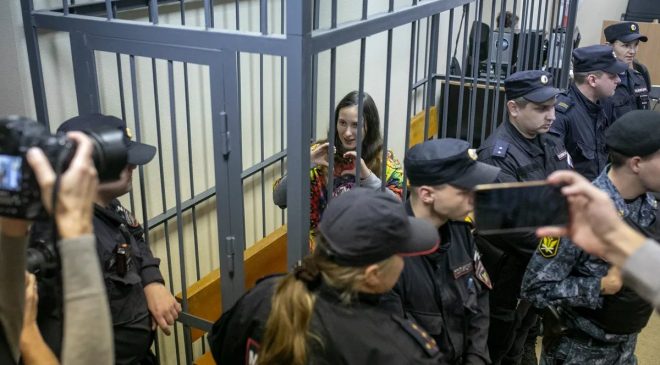
On Thursday, a Russian court sentenced artist Aleksandra Skochilenko to seven years in prison for replacing supermarket price tags with information about Russia’s full-scale invasion of Ukraine. When the judge announced the outrageous verdict, the packed courtroom erupted with chants of “For shame!” in support for Skochilenko, who smiled and made a hand heart back at them.
Authorities charged Skochilenko with spreading “fake” information about the war. The “fake” information? That decades of Putin’s televised lies conditioned some Russians to justify the war, about Russia’s bombing of a Mariupol theatre sheltering civilians, Russia sending conscripts to fight in Ukraine—which the Defence Ministry admitted—and calls to stop the war. “You are passing a judgment on a musician, artist, and pacifist.… I believe in the sanctity of life. … O yes, life! It is incredible, striking, unique, tenacious, powerful,” Skochilenko said in her closing statement. “War … More pain, more grief, more sorrow. And so, I cannot comprehend: why war?”
Skochilenko’s prison sentence is a blatant injustice but does not fully convey the cruelty with which the state exacted its revenge on her. During 19 months of court proceedings, a prosecutor reportedly laughed at her health conditions, which include celiac disease and a congenital heart defect; prison authorities confiscated her medications; during transfers from pretrial detention she was left without any food for days; and the judge refused hearing breaks to allow her drink water, use the bathroom, or replace batteries in her heart monitor.
This is only the most recent example of how the government and courts wilfully ignore that Russia’s domestic and international legal obligations protect freedom of expression. A former Moscow local councilman, Aleksey Gorinov, was also sentenced to seven years under the same law as Skochilenko. In November 2022, the United Nations Working Group on Arbitrary Detention called on Russia to release Gorinov after concluding that his imprisonment was discriminatory and imposed in retaliation for legitimate expression of his anti-war opinion. The working group noted that perversely, far from prosecuting people for anti-war sentiment, Russia has human rights treaty obligations to prohibit any propaganda for war.
That conclusion holds true for Skochilenko and many others. More than 200 people have faced prosecution for “fake” news on Russia’s war in Ukraine alone. The authorities have tossed hundreds behind bars for opposing the war using Russia’s broad arsenal of repressive legislation. Aleksandra Skochilenko’s attorneys said they would appeal the verdict. But what Russia should do is release her, strike her conviction, and repeal the laws that enable these abusive prosecutions.
